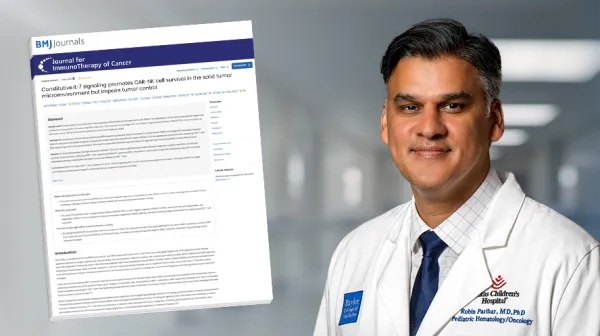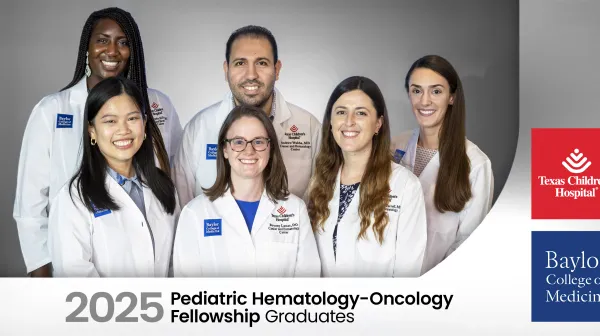Robin Parihar, MD, PhD
- Cancer and Blood Disorders

Assistant Professor, Department of Pediatrics, Division of Hematology-Oncology, Baylor College of Medicine
Associate Director, Hematology-Oncology Fellowship Program
Research Member, Dan L Duncan Comprehensive Cancer Center, Baylor College of Medicine
Faculty Member, Center for Cell and Gene Therapy, Baylor College of Medicine
Office location:
1102 Bates Avenue
Houston, TX 77030
Get to know Robin Parihar, MD, PhD
Dr. Robin Parihar is a pediatric hematologist-oncologist with a clinical interest in children with solid tumors such as rhabdomyosarcoma and neuroblastoma. He serves as a member of the Solid Tumor Programs, including the Neuroblastoma Program, and specializes in patients with tumors of the bone, muscle, and soft tissue. He is board certified by the American Board of Pediatrics in general pediatrics and pediatric hematology-oncology.
Education
| School | Education | Degree | Year |
|---|---|---|---|
| Baylor College of Medicine | Fellowship | Pediatric Hematology-Oncology | 2015 |
| Cleveland Clinic Foundation | Residency | Pediatrics | 2012 |
| Wright State University | Medical School | Doctor of Medicine | 2008 |
| Ohio State University | PhD | Doctorate of Philosophy, Immunology | 2004 |
| Wake Forest University | Bachelors | Chemistry | 1997 |
Organizations
| Organization Name | Role |
|---|---|
| American Academy of Pediatrics (AAP) | Member |
| American Association for Cancer Research (AACR) | Member |
| American Society of Clinical Oncology (ASCO) | Member |
| American Society of Pediatric Hematology and Oncology (ASPHO) | Member |
| Children’s Oncology Group (COG) | Member |
Board Certifications
| Title |
|---|
| American Board of Pediatrics |
| American Board of Pediatrics - Pediatric Hematology/Oncology |
Honors and awards
- 2018
-
Young Investigator Award
American Society of Pediatric Hematology/Oncology (ASPHO) - 2018
-
Distinguished Young Investigator Research Award
Immuno-Oncology Young Investigators Forum - 2015
-
Faculty Teaching Award
Center for Cell and Gene Therapy, Baylor College of Medicine - 2015
-
Research Poster Award, First Place
Texas Children's Cancer Center Research Symposium - 2011
-
Trainee Research Award
American Society of Hematology (ASH) - 2004
-
Takeda Pharmaceuticals Scholar-in-Training Award
American Association for Cancer Research (AACR) - 2003
-
Dissertation Research Award
Susan G Komen Breast Cancer Foundation - 2002
-
Aventis Oncology Scholar-in-Training Award
American Association for Cancer Research (AACR)
* Texas Children’s Hospital physicians’ licenses and credentials are reviewed prior to practicing at any of our facilities. Sections titled From the Doctor, Professional Organizations and Publications were provided by the physician’s office and were not verified by Texas Children’s Hospital.
Highlights
Research Area:
Immunotherapy
Neuroblastoma
Dr. Parihar’s research interests center around finding new ways in which to enhance the body’s own immune system to detect and destroy cancer. He has worked in the field of immunology for over a decade and has contributed to numerous translational research projects investigating the role of various immune cells in the control of cancer.
Dr. Parihar's lab, located within the Center for Cell and Gene Therapy, investigates the role of a specific type of immune cell called the natural killer (NK) cell. His research projects aim to enhance NK cell functions in order to target the tumor microenvironment, essentially getting rid of the accessory cells that help a tumor resist standard therapies. He is introducing the enhanced NK cells as therapy for children with advanced cancers. In addition, his lab has established lab models to better understand how the tumor microenvironment suppresses the immune system, in order to develop new approaches to overcome this inhibition and improve immune-based therapies for pediatric cancers.
Dr. Parihar has served as a principal investigator and collaborator on grants examining NK cells as anti-cancer therapy and published extensively on the subject. In addition to his interest in immunology and its relation to cancer, Dr. Parihar also places great importance in the role of the physician at the bedside, as an advocate and communicator for patients and their families. Thus, he has always been interested in clinically relevant research, with the ultimate goal of translating basic science discoveries made in his lab into novel clinical treatments for children with cancer.
Learn more about the Center for Cell and Gene Therapy





